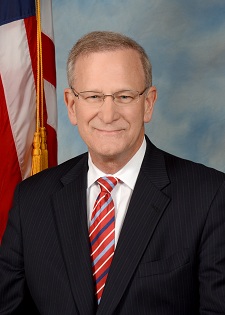
Well, that’s not quite what Federal Deposit Insurance Corporation‘s (FDIC) Vice Chair Thomas Hoenig said; however, there was no question about his position. A recent Reuter’s article, “Payouts, not capital requirements, are to blame for fewer bank loans: FDIC Chairman,” explains that Hoenig, in a recent letter, cautioned Senate Banking Committee Chairman Mike Crapo (R – ID) and the committee’s senior Democrat, Sherrod Brown (D – OH), “against relaxing current capital requirements and allowing the largest banks to increase their already highly leveraged positions.”
After the 2008 financial crisis, tighter regulations were put in place which were meant to prevent the havoc the bigger banks had inflicted on the economy in the first place. The most powerful banks, the “too big to fail” banks (TBTF), have never stopped agitating for fewer regulations and lower capital and they now have Congress’ attention — which is considering deregulating the banks once again.
Some banks are claiming that current capital requirements are preventing them from lending to consumers and businesses. Mr. Hoenig, in essence, says that’s nonsense!
“I recognize that dividends are an important factor for investors and they should be rewarded for the risks they take. But it is also true that funding business growth, assuring future economic success, and promoting capitalism depends upon the retention of earnings,” he wrote.
Mr. Hoenig analyzed the 10 largest banking companies and discovered that they will distribute approximately 100% of their current year earnings to their investors in the form of dividends and share buybacks.

[Source: Letter from Hoenig, July 31, 2017]
Mr. Hoenig advised the Senators to not listen to bankers telling them they need to lower capital requirements in order to increase lending. He said that the increased lending can be supported by retaining earnings, rather than paying dividends and huge share buybacks to shareholders. According to Mr. Hoenig, the 10 biggest banks could boost lending by $1 trillion annually simply by holding onto these earnings.
Mr. Hoenig advises, “I can only caution against relaxing current capital requirements and allowing the largest banks to increase their already highly leveraged positions,” he said. “The real economy has little to gain, and much to lose, by doing so.”
In a letter to his shareholders this spring, JPMorgan Chase CEO Jamie Dimon wrote that “it’s clear that the banks have too much capital… and we think it’s clear that banks can use more of their capital to finance the economy without sacrificing safety and soundness.” Mr. Dimon has been very vocal regarding his intent to put more money into share buybacks and is a major force behind pushing regulators to lower capital requirements. He and other big banks imply that are prevented from making more loans to fuel the economy by the government capital restrictions.
Mr. Hoenig disagrees that higher capital levels do not prevent banks from issuing loans. In his opinion, banks with higher capital built up through retained earnings can, in fact, lend more. Senators Brown and Crapo are attempting to find bipartisan agreement on regulatory relief at the same time the present administration and many Republicans are working to get rid of some of the regulation which has been put in place since the 2008 financial crisis.
There’s a danger here which the recent positive stress tests triggered. The stress test results sent Wall Street on a major stock buyout spree, which I talked about at length in my last post. Almost immediately, the Wall Street banks announced they were planning to dramatically increase their share buybacks. Mr. Hoenig incorporated the planned large share repurchases in his analyses.
I have written that stock repurchases do not accomplish anything productive and are for the short term EPS increases, as contrasted with capital expenditures, which are typically made for increasing long-term productive assets and are thus expenditures, “investments” in the companies’ future.
As Rana Foroohar stated in a May 15, 2016 Financial Times op-ed, ”It is easier for chief executive officers with a shelf life of three years to try to please investors by jacking up short-term share prices than to invest in things that will grow a company over the long haul.”
Let’s not overlook that Mr. Hoenig was president of the Kansas City Federal Reserve Bank and a member of the Fed’s policy–setting Federal Open Market Committee (FOMC) from 1991- 2011. He was front and center during the crisis and is now charged with protecting the safety of our banks. He has experience of what deregulation run amok can do.
I suggest we pay attention to what he has to say before we go down the same path we did leading to 2008.
Related Posts
Don’t Pop Open the Bubbly Just Yet! This Market Buying Activity Used to be illegal
Bamboozling by Banks and Regulators Reaches An All Time High!
Unfinished Business and Financial Reforms with Elizabeth Warren

 Richard Bowen is widely known as the Citigroup whistleblower. As Business Chief Underwriter for Citigroup during the housing bubble financial crisis meltdown, he repeatedly warned Citi executive management and the board about fraudulent behavior within the organization. The company certified poor mortgages as quality mortgages and sold them to Fannie Mae, Freddie Mac and other investors.
Richard Bowen is widely known as the Citigroup whistleblower. As Business Chief Underwriter for Citigroup during the housing bubble financial crisis meltdown, he repeatedly warned Citi executive management and the board about fraudulent behavior within the organization. The company certified poor mortgages as quality mortgages and sold them to Fannie Mae, Freddie Mac and other investors.

